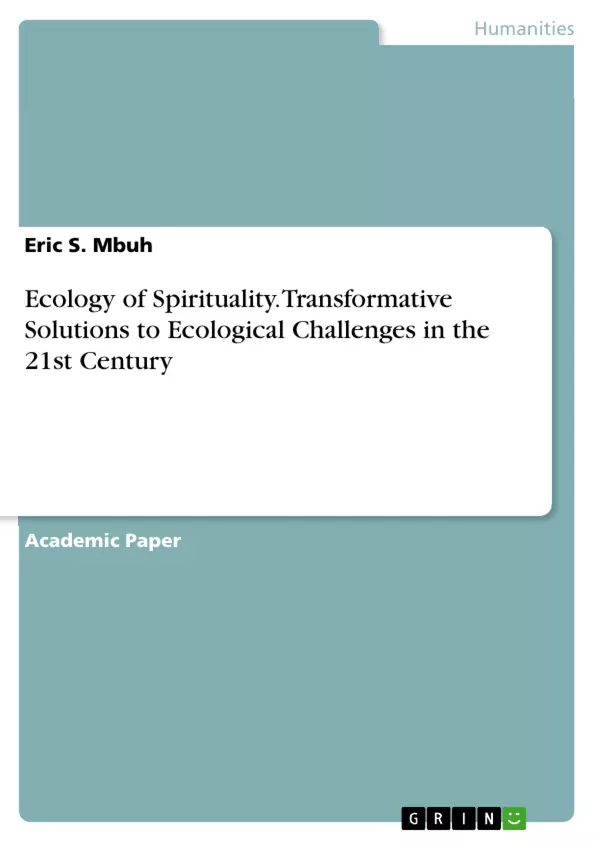This paper presents a symbiotic relationship between humanity and the ecosystem. The solution to this problem comes from the spiritual state of man. The methodology used in the paper is a transformative approach to the ecological challenges faced in the 21st century. The approach will use a theoretical lens to formulate interpretations from the ontological perspective that call for action agendas for reform and change. The first part of the paper deals with what God has done in creation through what theologians call common grace. The second part deals with man’s duty and responsibility toward creation. The third gives some implications of the destruction of the creation to the ecosystem, animals, and humans. This will be seen through the carbon cycle and water cycle. The findings of this paper are that humanity needs to rethink the growth in population without the growth and maintenance of the other areas of the ecosystem. Therefore, we have to learn from God and imitate him in His creation process.
Inhaltsverzeichnis (Table of Contents)
- GOD'S ROLE IN HIS CREATION: COMMON GRACE-
- Environmental wealth-
- Social wealth,---
- Physical wealth (health capital),
- Institutional wealth---
- HUMANITY'S ROLE IN GOD'S CREATION-
- Population Growth.
- Food production and maintenance.
- Afforestation and Reforestation--
- What is Afforestation?
- Check Pollution.
- Ground Water Pollution--
- Atmospheric Pollution--
- Carbon Cycle.
- Photosynthesis-
- Respiration-
- Water Cycle--
- CONCLUSION--
Zielsetzung und Themenschwerpunkte (Objectives and Key Themes)
This paper argues that the environmental and ecological challenges faced in the 21st century are rooted in spirituality. It proposes that transformative solutions must also be spiritual, leading to the concept of "ecology of spirituality." The paper aims to help Christians recognize the spiritual dimension of ecological issues and encourages them to take the lead in finding transformative solutions.
- The spiritual root of ecological challenges
- The transformative power of spiritual solutions
- The role of Christians in leading ecological change
- The need for a holistic approach to environmental stewardship
- The importance of balancing population growth with ecological maintenance
Zusammenfassung der Kapitel (Chapter Summaries)
The first part of the paper examines God's role in creation, emphasizing the concept of "common grace" which refers to God's general blessings bestowed upon all creation. The second part delves into humanity's responsibility toward God's creation, focusing on key areas like population growth, food production, afforestation, and pollution control. The paper explores the interconnectedness of the carbon and water cycles, highlighting how human actions impact the environment and ultimately affect human well-being.
Schlüsselwörter (Keywords)
The primary keywords of this work revolve around environmental stewardship, ecological challenges, transformative solutions, spirituality, common grace, population growth, pollution, carbon cycle, water cycle, and the importance of a holistic approach to creation care.
Frequently Asked Questions
What is the "ecology of spirituality"?
The ecology of spirituality is a concept proposing that environmental and ecological challenges in the 21st century are rooted in spirituality, suggesting that transformative solutions must also be spiritual in nature.
How does the paper define "common grace" in an ecological context?
In this paper, common grace refers to God's general blessings bestowed upon all creation, which include environmental, social, physical, and institutional wealth shared by humanity.
What are humanity's primary responsibilities toward creation according to the text?
Humanity is responsible for managing population growth, maintaining food production, practicing afforestation and reforestation, and controlling pollution in both the atmosphere and groundwater.
What is the significance of the carbon and water cycles in this study?
The paper uses the carbon and water cycles to illustrate the interconnectedness of the ecosystem and show how human-driven destruction of these cycles impacts animals, humans, and the environment.
What are the main findings regarding population growth?
The findings suggest that humanity needs to rethink population growth if it occurs without a corresponding growth and maintenance of other areas within the ecosystem.
What role should Christians play in ecological challenges?
The paper encourages Christians to recognize the spiritual dimension of ecological issues and take a leading role in finding transformative solutions through creation care.
- Quote paper
- Eric S. Mbuh (Author), 2022, Ecology of Spirituality. Transformative Solutions to Ecological Challenges in the 21st Century, Munich, GRIN Verlag, https://www.grin.com/document/1301033



